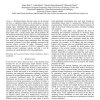Free Online Productivity Tools
i2Speak
i2Symbol
i2OCR
iTex2Img
iWeb2Print
iWeb2Shot
i2Type
iPdf2Split
iPdf2Merge
i2Bopomofo
i2Arabic
i2Style
i2Image
i2PDF
iLatex2Rtf
Sci2ools
170
click to vote
DSRT
2009
IEEE
2009
IEEE
DCS: A Distributed Coordinate System for Network Positioning
Predicting latency between nodes on the internet can have a significant impact on the performance of many services that use latency distances among nodes as a decision making input. Coordinate-based approaches are among the family of latency prediction techniques where latency between each pair of nodes is modeled as the virtual distance among those nodes over a virtual system. This article proposes the Decentralized Coordinate System (DCS) as a fully distributed system that does not rely on any infrastructure support from the underlying network. DCS uses a two-phase algorithm: first, each host is assigned rough coordinates, then, the rough estimation is refined in a way that it gradually converges to the accurate relative position of nodes. Simulation results demonstrate that the accuracy of DCS is competitive with existing network coordinate systems and that it can be considered as a good alternative for some applications. Keywords- peer-to-peer networks, virtual coordinates, latency...
Coordinate Systems | DSRT 2009 | Latency Prediction | Latency Prediction Techniques | Modeling And Simulation |
Related Content
| Added | 17 Feb 2011 |
| Updated | 17 Feb 2011 |
| Type | Journal |
| Year | 2009 |
| Where | DSRT |
| Authors | Negar Hariri, Jafar Habibi, Shervin Shirmohammadi, Behnoosh Hariri |
Comments (0)

